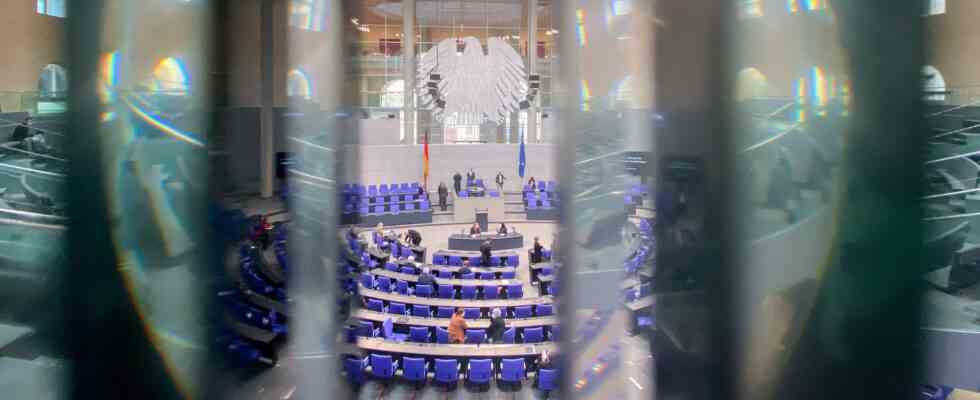Status: 01/27/2023 07:49 a.m
The Bundestag is discussing how it can be reduced. The problem: The traffic light coalition’s draft law has caused loud criticism from the Union. So she makes her own suggestions. It is unlikely that both sides will come together.
For Friedrich Merz, the traffic light plans are going in the wrong direction. The CDU leader therefore proposes: “It remains with the constituency vote and it remains the case that those who win the constituencies also receive a mandate in the German Bundestag without any other requirements having to be met.”
Abolish overhang and compensation mandates
But that’s exactly what the traffic light wants. She wants to abolish overhang and compensation mandates. According to the proposal by the SPD, Greens and FDP, constituency winners will only be elected to parliament if their party has secured enough second votes.
For example, if 40 candidates win their constituency, but their party only has the votes for 30 constituencies, the ten candidates with the worst first-vote scores in a state will be out. That would probably be candidates in the big cities in particular, because here the race between the parties is particularly close.
Overhang mandates often in the CDU and CSU
Overhang mandates are currently particularly common in the CDU in Baden-Württemberg and in the CSU in Bavaria. Three of them are not compensated for by other parties – currently an advantage for the Union, which the traffic light wants to end with its reform.
The CDU and CSU propose something else: the number of constituencies should be reduced. More candidates should come to parliament via the state lists. And up to 15 overhang mandates should no longer be compensated.
Union application does not contain a precise cap
SPD parliamentary group leader Rolf Mützenich considers this unacceptable. He explained: “I find it a bit daring that the Union has come up with a proposal that really shouldn’t have seen the light at all.”
The CDU and CSU have not formulated their own draft law. Her application does not state exactly how large the Bundestag should be in the future. There it says only: The size should develop “in the direction of 590 MPs”. However, not mandatory. The Bundestag should only “commit” to this.
Union wants higher hurdles for small parties
The Union also proposes higher hurdles for small parties. So far, three won constituencies have secured their way into parliament. According to the Union, five will be needed in the future. With the current results, that would be the end for the left-wing faction. Group leader Amira Mohamed Ali therefore finds clear words for the Union. She said: “It’s also clear what she’s about: she wants to keep the left out of the Bundestag. Of course we can’t agree with that and I have to say: I think it’s really shabby.”
Trying to silence political opponents in this way is indecent.
Agreement of the left for traffic light proposal unclear
It is still unclear whether the left will rally behind the traffic light proposal. The party has been working on a major electoral reform for years. According to Britta Haßelmann, however, this has always failed because of the CSU. The leader of the Greens calls this the blockade of a regional party. She said: “In times of crisis, in which we demand a lot from citizens, from industry, business, trade – the Bundestag must also prove that it is making reforms to itself.”
FDP wants a broad alliance
The traffic light continues to campaign for the support of the Union. The FDP in particular would like a broad alliance. But not at any price, as parliamentary group leader Christian Dürr says. It is clear that proportionality must prevail.
This means that if the Bundestag is reduced in size, all parties and parliamentary groups will be equally affected.
The talks should be continued on this basis, adds Dürr.
The traffic light receives support from an unfamiliar corner – from the AfD. Group leader Alice Weidel said it was a “very good move to finally take up the AfD’s demands”. Weidel also added: “Personally, I have to tell you that the Bundestag should be much smaller.”
The traffic light wants to get its proposal through the Bundestag by Easter. Your own majority is enough. This is another reason why a compromise with the Union seems unlikely.
Bundestag discusses electoral law reform
Björn Dake, ARD Berlin, 26.1.2023 7:18 a.m

